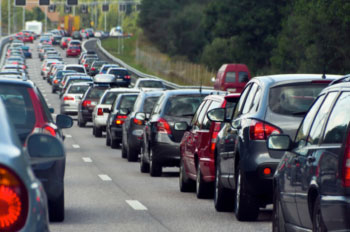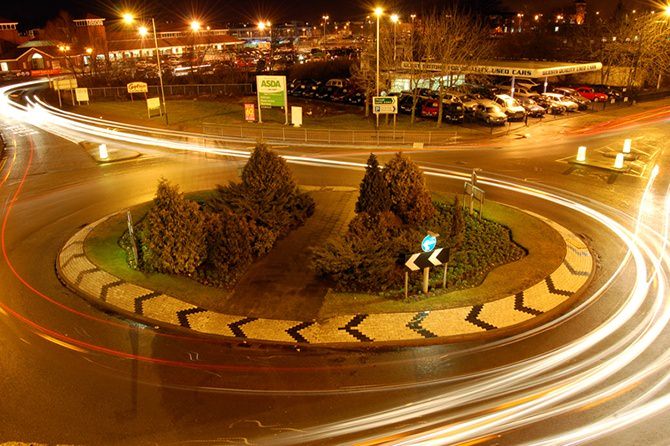People who drive a passenger vehicle in a big city (or even its suburbs), usually have to concern themselves with the scourge of traffic congestion. And if you have ever been in a heavy traffic jam where there doesn’t appear to be any end in sight, it always seems like its the worst traffic in recorded history.
 But unless drivers frequently travel throughout the country by car, they probably don’t have much of a sense about where traffic is heavier or lighter than anywhere else. Is there a way to determine which city has the worst traffic conditions?
But unless drivers frequently travel throughout the country by car, they probably don’t have much of a sense about where traffic is heavier or lighter than anywhere else. Is there a way to determine which city has the worst traffic conditions?
One company does exactly that – and the top city on their most-congested list probably won’t surprise you.
And the “Worst U.S. Traffic Award Goes to…”
INRIX is a company that focuses on traffic patterns in congestion in all major cities in North America and Europe. Its Traffic Data Archive actually analyzes and interprets real-time traffic data for all urban areas in every quarter hour of every day all year long. The firm then expresses its findings through an INRIX Index which represents more congestion based on how large the number is.
When INRIX analyzed all urban areas in the U.S., the city with the most traffic congestion for 2013 was – you guessed it – Los Angeles.
The City of Angels beat out all other American cities with an INRIX Index of 31.3. LA overtook Honolulu, the second-most congested urban area on the list, to gain the top spot back in May of 2012. Honolulu’s 30.6 index is about 15% higher than San Francisco’s index of 26.6, which is good for the third on the list. Then there’s another large dropoff to the number 4 spot, where Austin comes in with an index of 22.5; followed by a tie between New York and Bridgeport at 20.8. Rounding out the top 10 most congested cities: San Jose (19.4), Seattle (18.8), Boston (17.9), and Washington (16.2).
Is L.A. Traffic the Heaviest in the World?
Here’s another interesting question: how does Los Angeles traffic stack up against major European cities?
 It turns out that LA is more congested than all European urban areas as well, except for two. Brussels, Belgium notched a 2013 INRIX Index of 33.4; while Milan, Italy was a close second at 33.1. In fact, LA just nudged out another Belgian city, Antwerp (31.3) for the number three spot on the list, followed by Honolulu in fifth place. The last five spots in the Top Ten are: London, England (29.7); San Francisco; Manchester, England (25.5); Paris, France (24.4); and Rotterdam, Netherlands (23.2).
It turns out that LA is more congested than all European urban areas as well, except for two. Brussels, Belgium notched a 2013 INRIX Index of 33.4; while Milan, Italy was a close second at 33.1. In fact, LA just nudged out another Belgian city, Antwerp (31.3) for the number three spot on the list, followed by Honolulu in fifth place. The last five spots in the Top Ten are: London, England (29.7); San Francisco; Manchester, England (25.5); Paris, France (24.4); and Rotterdam, Netherlands (23.2).
More Traffic = Higher Car Insurance Costs
Not surprisingly, drivers who live in heavily-congested cities tend to pay more for auto insurance. That’s because the more vehicles there are in a given space, the higher the likelihood of collisions. And when the risk of collisions is high, insurers will charge drivers more for their car insurance policies.
Auto Insurance Specialists can help you keep auto insurance costs down by providing you with multiple rate quotes, thereby making insurers compete for your business. Plus, it only takes a few minutes to obtain these quotes, and you can do everything from the comfort of your home computer, telephone or mobile phone.
So if you think you’re paying too much for auto insurance, consider switching to AIS. It won’t make your daily commute any shorter, but at least you can savor the fact that you’re saving money while you’re stopped in freeway traffic.
The information in this article was obtained from various sources. This content is offered for educational purposes only and does not represent contractual agreements, nor is it intended to replace manuals or instructions provided by the manufacturer or the advice of a qualified professional. The definitions, terms and coverage in a given policy may be different than those suggested here and such policy will be governed by the language contained therein. No warranty or appropriateness for a specific purpose is expressed or implie


